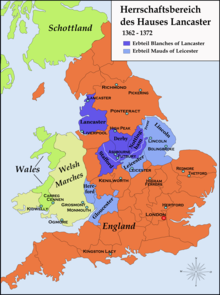Matilda Plantagenet, Countess of Leicester
Matilda Plantagenet, Countess of Leicester (also Maud of Lancaster or Matilda of Hainaut ; * April 4, 1339 in Lindsey ; † April 10, 1362 ) was an English noblewoman and by marriage Duchess of Straubing-Holland .
origin
She was the eldest daughter of Henry of Grosmont, 1st Duke of Lancaster and his wife Isabel de Beaumont and, like her nephew, who later became King Henry IV , was born in Bolingbroke Castle in Lindsey .
First marriage
As a child, Matilda was married on November 1, 1344 to Ralph Stafford, eldest son and heir of Ralph de Stafford, 1st Earl of Stafford († 1372). However, he died a few years later, in 1347 at the latest.
Second marriage
Her second marriage was in London in 1352, when she married the Wittelsbacher Wilhelm I , Duke of Lower Bavaria-Straubing-Holland, son of the Roman-German Emperor Ludwig of Bavaria and Margaret of Holland . She had a daughter with Wilhelm, who died in 1356. She soon fell out with her brother-in-law Albrecht , who had acted as regent for her mentally ill husband since 1358, which in 1361 even led to an uprising of Middelburg against Albrecht, supported by England .
The Lancaster legacy
Her father died of the plague on March 23, 1361 , whereupon his title of Duke of Lancaster became extinct. His baronies probably fell into abeyance , while the earl dignities and all lands, presumably according to the law of inheritance at the time, passed to his two daughters Matilda and Blanche as joint heirs, who had to divide them up among themselves.
Matilda returned to England after the death of her father and in July 1361 arrangements were made by mutual agreement regarding the division of the property of the late Duke of Lancaster: According to this, Matilda essentially received the lands in Gloucestershire , Herefordshire , Leicestershire and the Welsh Marches and the Claim to the title of Countess of Leicester .
Matilda died completely unexpectedly on April 10, 1362 in England, probably also of the plague. Since she left no descendants, her paternal inheritance now fell entirely to Blanche and her husband, John of Gaunt , was awarded the title Duke of Lancaster .
Individual evidence
- ^ Alison Weir: Britain's Royal Families. The Complete Genealogy. The Bodley Head, London 1999, p. 76
- ^ A b c Marjorie Anderson: Blanche, Duchess of Lancaster. In: Modern Philology. Volume 45, 1948, p. 154.
- ^ Charles Mosley: Burke's Peerage and Baronetage. Burke's Peerage (Genealogical Books) Ltd, Crans (Switzerland) 1999, Volume 1, p. 28.
- ^ Anthony Goodman: John of Gaunt. The Exercise of Princely Power in Fourteenth-Century Europe. Longman, London 1992, ISBN 0-582-50218-7 , p. 43
Web links
- Matilda Plantagenet, Countess of Leicester on thepeerage.com , accessed September 10, 2016.
| personal data | |
|---|---|
| SURNAME | Matilda Plantagenet, Countess of Leicester |
| ALTERNATIVE NAMES | Maud of Lancaster; Matilda of Hainaut |
| BRIEF DESCRIPTION | English noblewoman, Duchess of Straubing-Holland |
| DATE OF BIRTH | April 4, 1339 |
| PLACE OF BIRTH | Bolingbroke Castle |
| DATE OF DEATH | April 10, 1362 |
